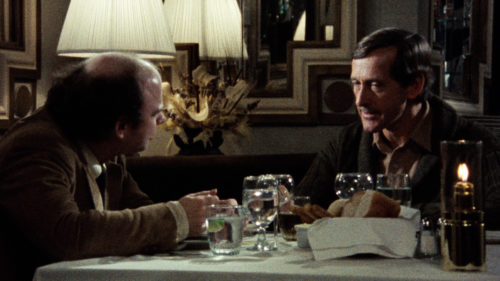Some characterizations of My Dinner with André, 1.
Wally feels obligated to dine with André but dreads it because he has heard that André is deeply troubled and feels there is nothing he can do to help. Wally is also overwhelmed by the pressures of practical life: he can’t do anything but worry about how he will pay his bills. He settles on a solution to his immediate problem: he’ll merely ask questions of André, something he enjoys doing. That works, but in the course of his dinner with André something more happens: the meal ends with Wally a little less overwhelmed than he was when it began.
André wants to live each moment as intensely as possible, but he seems to think that this requires him to eschew any sense of a quest for larger, objective value. Wally, on the other hand, indicates that he values stable and committed relationships and his contributions, however small, to the theater, and expresses an identification with the scientific enterprise and so with a central narrative tradition of Western Civilization. But he doesn’t find many moments of passionate intensity in his day-to-day life, which, in contrast to André’s, seems to have isolated him from others. The film, narrated from Wally’s point of view, conveys his renewed appreciation for the quality of immediate experience for those with whom he shares his world. On his way home after dinner he’s noticeably more attentive to what his city means to him, and he resolves to share his experience with his girlfriend Debby.
André and Wally have different views about the meaning of life. André wants to live each moment as intensely as possible and believes that he can accomplish this by undergoing extreme experiences. Wally values stable relationships and commitments and takes pleasure accomplishing the everyday tasks they require, hoping also to occasionally contribute to the theater. As the film begins, however, Wally doesn’t take any pleasure in ordinary life and doesn’t have time to contribute to the theater. André is passionately engaged with his activities, but they don’t seem to make sense to anyone but him. Wally’s values and aims are perfectly intelligible, but he doesn’t find them fulfilling. As he listens to André’s exotic stories, Wally realizes how much he loves his life and he reminds himself of this on his way home. We’re left wondering about whether the conversation has had an impact on André. Continue reading


